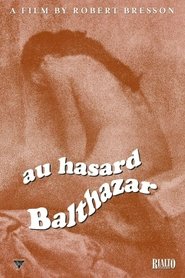Unspeakably sad. As in, it's difficult to think about this film without tearing up.
I am not religious, yet there's definitely something about the "film’s strange, holy emotional effects" of Balthazar that speak to me beyond the near endless suffering and dignity of an animal.
Something sticks out in Roger Ebert's otherwise effective introduction to a film (by a director whose famous "necessary images" often are unsparingly austere in explaining what is going on):
Marie is a weak girl, who rejects the sincere Jacques when he returns as a young man, to say he still loves her. She prefers Gerard, who mistreats her but seems glamorous with his leather jacket and motor bike.
This, at the very least, seems to be a misreading of what Marie sees in Gerard. She is neither terribly impressed by Gerard's surface style nor possessions, but the people and culture that surround her are one based in a very human form of cruelty. Thus it is Gerard's innate sadism and callous cruelty is his appeal, not his flair and motorbike. Bikes, often a symbol representing freedom from rural life, likely cannot apply to Balthazar, for Marie can theoretically leave anytime she likes in her Citroën 2CV. But, of course, we know she never will.
— Il y a beaucoup de hasard en tout ceci, et un second hasard, celui de notre mort, souvent ne nous permet pas d’attendre longtemps les faveurs du premier. [There is a large element of chance in these matters, and a second chance, that of our own death, often prevents us from awaiting for any length of time the favours of the first.]
— Marcel Proust: Swann's Way
[A] catharsis occurs when Balthazar, dying from an action wrought by human absurdity, is surrounded by sheep in a field as Schubert’s Piano Sonata no. 20 is reprised on the soundtrack. This moment of grace—in which Balthazar’s heroic dignity is recognized and given its due by other subjugated animals—is one of the most beautiful and surpassingly moving stanzas in art. A world in which Balthazar would go unnoticed is a world that might not be worth saving.
— Chuck Bowen (Slant Magazine)
Bresson’s obdurate vision and style produced a cinema of paradox, in which the denial of emotion creates emotionally overwhelming works, minimalism becomes plenitude, the withholding of information makes for narrative density, fragmentation evokes a sense of the world’s wholeness, and attention to “the surface of the work”, as Bresson called it, produces inexhaustible depth.
— James Quandt: Robert Bresson (1998, p. 7)
I don’t know what’s to account for the recent critical impulse to try and downplay or subjugate the streak of Catholicism in Bresson’s work [but] there for the grace of God [in the Criterion DVD extras] is Bresson explaining that he named the donkey after one of the three wise men and that the film is about the anxiety of humans in the face of the completely holy being that is the titular animal.
— Eric Henderson (Slant Magazine)
The film’s steady accumulation of incident, characters, mystery, and social detail, its implicative use of sound, offscreen space, and editing, have the miraculous effect of turning the director’s vaunted austerity into endless plenitude, which is perhaps the central paradox of Bresson’s cinema.[…]
[Bresson] later regretted the rather sentimental employment of the Schubert in Balthazar, and [yet] the film without it would be significantly bleaker in effect.
[…]
A common reading of Balthazar [ascribes] to the animal a Christlike status. In this schema, Balthazar, after enjoying a brief, paradisial childhood[,] lives a calvary. Passed from cruel master to cruel master, Balthazar traverses the stations of the cross, beaten, whipped, slapped, burned, mocked, and, in the concluding crucifixion, shot and abandoned to bleed to death, the hillside on which he slowly perishes a modern-day Golgotha. That he dies literally burdened (with contraband) suggests, in this reading, a sacrifice for humanity. This meaning is intensified by Balthazar’s sole, stigmata-like wound and by the sheep that flow around him, a tide of white that surrounds his dark, prostrate form. With their tolling bells, they evoke the Agnus Dei and thereby the liturgy[.] Balthazar has died for the sins of those who have transgressed against him—the alcoholic Arnold, the vicious Gérard, the mean, miserly merchant—and of the few who have not, particularly the martyred Marie, whose fate parallels his.
[…]
The [Christian] interpretation is tempting in its simplicity[, but] Bresson’s art never proceeded by strict or simple analogy—he is no C. S. Lewis, no Christian allegorist—and he always resisted such a reductive reading of Balthazar.
[…]
[Marie], too, passes from master to master [but] there is no release from her suffering. She simply disappears near the end of the film, one infers into a universe of servitude.
— James Quandt (Criterion)
Synopsis: The story of a donkey Balthazar as he is passed from owner to owner, some kind and some cruel but all with motivations beyond his understanding. Balthazar, whose life parallels that of his first keeper, Marie, is truly a beast of burden, suffering the sins of humankind. But despite his powerlessness, he accepts his fate nobly.

